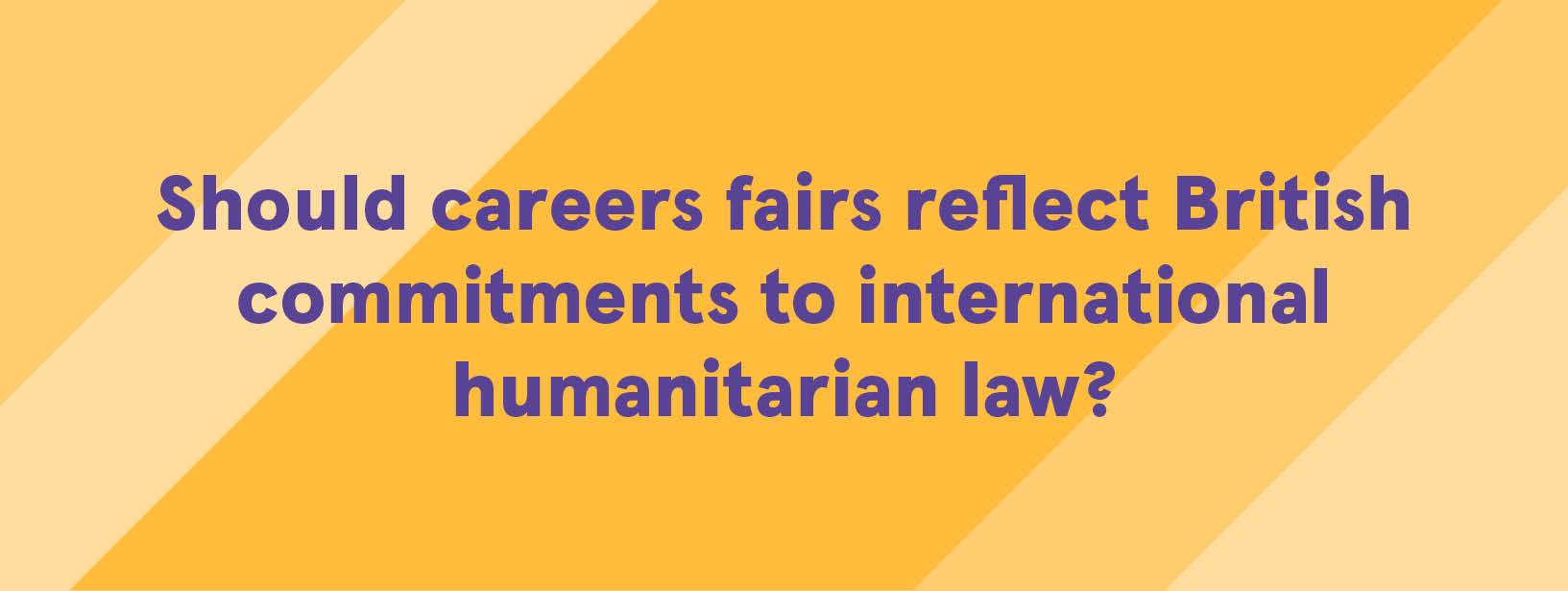Should the University of Leeds promote ethical companies whose values align with international humanitarian law, and limit participation of those who don’t at careers fairs?
You have until Friday at 5pm to vote in the referendum on whether the University should restrict careers fair access to companies whose values don’t align with international humanitarian law. We spoke to the students’ heading up the Yes and No sides of the debate, to get their opinions on the issue. Have a read and don’t forget to vote here: https://www.luu.org.uk/yourideas/referendum/
Yes – Molly Johnson
Graduate employment is of the utmost importance, that is why the ‘Yes’ campaign wants to lobby the university to increase the options open to students in a more diverse range of career paths. With this we think it is necessary as a university to be engaged with the world around us and make sure that we are not only providing students with the means to have the best start to their careers but showing a commitment to making the world a more peaceful place. In short, the Arms Trade Treaty means that the UK government must assess all sales of arms by British companies. Recently the government had to issue a statement acknowledging that they had misled parliament of their assessments of arms sales by companies such as BAE Systems to the Saudi Arabia government. In a separate report the Ministry of Defence have said it has found 252 alleged violations of international humanitarian law committed by the Saudi-led coalition in the civil war in Yemen. British arms have been used to commit these abuses of human rights and the international community have sharply criticised the UK for their continued failure to carry out their legal responsibilities in the crisis.
This is not a matter of ethics, nor is this a subjective issue. This is a matter of law. The ‘Yes’ campaign is in total agreement with the arguments put forward by the ‘No’ campaign stating that students should be able to make these choices themselves, that is why the proposal does not include demands to lobby the companies to get rid of these graduate schemes outright. These schemes will still exist and students will be free to seek them out. However, the university as an institution with responsibilities towards its students should be a figurehead for positive change. Choice will not be limited but expanded in sectors such as sustainability and development. The international community have decided on the wrongdoing in the sale of arms by these companies. It is by the standards of international law that this proposal is based, not personal feelings or subjective interpretations of ‘ethics’.
That is why it is time for the University of Leeds to show that it is a body committed to helping its students contribute to a better world fitting with the legal commitments that Britain has made.
No – Joseph Ribbons
It’s important to note straight away that no one is in denial or blind to the suffering of those in Yemen, and no one in the No camp of this referendum is ignorant to the fact that British made weapons have featured in evidence of the war crimes committed by Saudi Arabia.
This is in fact the crux of the No argument. This referendum, whilst having good intentions, is genuinely misplaced in its focus, and ironically ill-informed over what STEM students do and do not know about the companies in question. At the debate earlier this week it was made clear by myself and those in attendance, that to suggest that the target demographic of the companies in question is ill-informed, is a great insult to our intelligence, and the staff who lecture and assess us on ethics and the members of staff who have previously worked in this field.
There are STEM students who have said they wouldn’t feel comfortable working for a defence company, but certainly wouldn’t want to stop their fellow students working for them. It is the presence of staff members from these companies at careers fairs, industry advisory boards and project meetings that has allowed them to come to this conclusion. To remove or restrict their presence on campus would actually reduce the information that students are exposed to – they would have to rely on marketing material to make a decision.
On top of the personal involvement that these companies have with the body, they also provide hundreds of thousands of pounds in research funding every year, allowing students to pursue projects and degrees that aren’t even related to Defence.
It was made clear by the proposal speaker that the ultimate intentions of the referendum are to remove the presence of these companies from campus – a large concern of STEM students and staff, and not something announced in the case’s arguments and proposals. We also have to ask at what point do we draw the line? There is enough evidence to suggest that the RAF, Airbus Defence and Space, Rolls Royce, and a lot more, are just as complicit as BAE systems in Yemen; so are we to ban all Aerospace and Defence options for students? On top of this, in what way to we plan to restrict them? There is currently no actual knowledge of what the Yes vote means for these companies and the students that fall into the target demographic.
The referendum asks to restrict those that have broken international humanitarian law, but the bottom line is that no company has thus far, broken international humanitarian law. So I find it troubling that these companies are already being brought into question. Do we really feel comfortable restricting these companies based on the opinions of an extremely small minority, consisting of those who do not fall into the target demographic of these companies in the first place? If your answer to that is no, then you should vote No.

